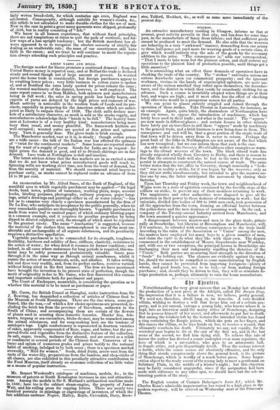An extensive manufacturer residing in Glasgow, informs us that at
present, great activity prevails in that city, and has done for some time past, in the manufacture of fancy dress fabrics; and that sufficient goods cannot be produced to meet the demand. He also adds that the weavers are behaving in a very "awkward " manner, demanding from one penny to three half-pence per yard more for weaving goods of a certain class, to give which would entirely stop the sale of the goods by the necessary addition to the price. "The consequence is," adds our correspondent, "That I mean to take none but the plainest orders, and shall restrict my operations to the plainest kind of production possible, until things get a little smoother."
It is astonishing what an effect these demands of operatives have in checking the trade of the country. The " strikes " and trades unions are serious drawbacks upon our commercial prosperity ; and the ignorant workmen, victims in the hands of unprincipled agitators, are quite un- aware of the serious mischief they inflict upon themselves, the manufac- turer, and the district in which they reside by causelessly striking for an advance. Such a course is invariably adopted when things are at their best, and wages are high ; and it most often has the effect of checking what otherwise would be a prosperous season for all parties.
We can point to places entirely crippled and ruined through the operation of these strikes. Take Preston in Lancashire, for instance, as an example. Again, quite lately, the shoemakers of Northampton have risen en masse to oppose tho introduction of machinery, which has
lately been used in their trade ; and what is the result ? he " uppers " are now made in different places ; and certain houses in other districts have lately put on travellers to sell these "uppers" made by machinery to the general trade, and a brisk business is now being done in them. The consequence and end will be, that a great portion of the staple trade of that town will be driven away front it, never to return. Perhaps the great bulk of the folks in Northampton are not aware of the fact which has now transpired ; but we can inform them that such is the case.
An able writer in the Cot entry Herald adduces other examples as warn- ings to the riband weavers of the town. The black riband trade has already migrated wholly from Coventry to Derby, and there is reason to fear that the oriental trade will also be lost to the town if the weavers persist in attempts to counteract the natural course of trade. The same writer states that the late affair in Coventry, though nominally a " lock- out " was in reality a strike, for it was begun by the weavers ; only as they did not strike simultaneously, but intended to give the masters no- tice one by one, the latter anticipated the movement by closing their factories.
Upon last Thursday and Friday week, the town and neighbourhood of Wigan were in a state of agitation occasioned by the forcible steps of the colliers on strike, to prevent any of their members returning to work. The magistrates and other authorities were disposed to give all the protection in their power to those desirous of returning to work ; but the unionists, divided into bodies of 500 to 1000 men each, took possession of all the approaches from the town, forming an effectual barrier between the police-force and the men desirous of resuming work. In the end, a company of the Twenty-second Infantry arrived from Manchester, and the town assumed a quieter appearance.
A disagreement between masters and men in the glass trade, princi- pally at Stourbridge but likewise at Birmingham and Manchester, will, if it continue, be attended with serious consequences to the trade itself. According to the rules of the Association or Union" among the men, the masters have employed too many boys to a given number of men, and claim the right to do what they like with their own. The dispute commenced in the establishment of Messrs. Grazebrooks near Wordsley, and, with one or two exceptions, the principal houses in Stourbridge are discharging their men and indignantly repelling the dictation of tho "Union." Both parties are measuring their strength in the direction of "funds" for holding out. The chances are evidently against the men; for, should the masters be compelled to cease manufacturing by Englis hands, they cannot be prevented from importing foreigners—plenty of whom, and good hands too, are to be had,—or from making foreign purchases ; and, should they be driven to this, they will so stimulate fo- reign production as, perhaps, ultimately to rum the home manufacture.


























 Previous page
Previous page